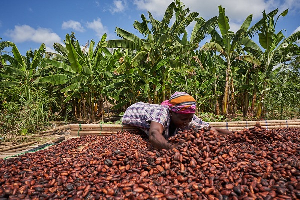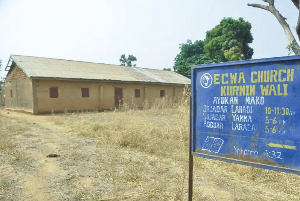On Saturday 1st November, the government declared every first Saturday of the month as a National Sanitation Day (NSD). On these days, citizens throughout the country will be required to take part in clean up exercises which is meant to get rid of filth in our chocked gutters, markets, our homes and neighborhoods. This is a step in the right direction as it will go a long way to help improve our environment, improve sanitation and our health generally.
To lead the way the President of the Republic John Dramani Mahama, Vice President Amissah-Arthur, Traditional Rulers’ such as the Asantehene Otumfuor Osei Tutu the second, the Okyehene Amoatia Oforipanin the second, workers, soldiers and policemen and the MP for Ayawaso West Wuogon, Hon Kyeremateng Agyarko, took part in the exercise .
While the first exercise in November was said to have gone reasonably well, the second exercise in December had a mixed rating as it was participated by a few committed members of the societies while a whole lot of people looked on unconcerned especially in some parts of Accra the capital city.
Some of the passive men and women interviewed said they were not aware about the exercise while others said they require their members of parliament and assembly men to lead the way in mobilizing the people in their areas and to provide them with working tools like brooms, boots and gloves to be able to take part in the exercise.
Others on their part kicked against the exercise saying some companies have been engaged and paid with our taxes to clean up our societies and get rid of garbage. There is no need therefore for volunteers to do the same job.
Some people also felt that the excuses being given by the passive citizens are uncalled for saying that the government cannot provide every volunteer with working tools to clean their own environment.
They advised that the entire citizens especially the youth must take part in the exercise in future or be forced to do so through legislation as done in some countries of Africa such as Nigeria. While I share the frustration of those who condemn the refusal by some people to take part in the exercise, I do not agree with the use of legislation to enforce the policy on clean up exercise. It must remain a voluntary undertaking to allow people to take part in it on their own volition.
If we require the services of many people in the clean up exercises, we need to reconsider the procedure for implementing the program by involving all those who matter in the country from the preparatory stages of the program and its implementation.
These include the political parties especially those in parliament, traditional rulers, civil society groups the police and the army, health workers, community organizations, drivers unions and market women.
With the support of the media the groups should be assisted to whip up interest in the exercise in their localities. There must be a conscious effort to call for support from donors to provide working tools and other items such as t-shirts and beverages.
This should be followed with the introduction of competition amongst the communities’, cities and regions in the exercise. The best of these communities’ cities and regions in the exercise should be rewarded annually as done for farmers, dancers and in beauty contests for being the best in cleaning their areas.
The benefit to be derived in this exercise is that the garbage to be collected could in future be sold (instead of being dumped) to some companies in Ghana and abroad to turn them into manure or used as raw materials for producing biogas energy for use in our homes and industrial set ups.
This is what happens in some countries that have to import garbage from other nations. With regard to the plastic wastes, the volunteers engaged in clean up exercise will have ready market for them as many people have been engaged to collect them in the cities a situation that has contributed to the plastic wastes being cleared from our streets and gutters of late.
The exercise if well managed will bring all manner of persons such as musicians’ sportsmen, the banks and donors to lend their support in kind and cash. This way many people from all walks of life clad in the branded attires of sponsors will struggle to overtake each others to embark on the exercise to make Ghana cleaner than it is today. Alhaji Alhasan Abdulai
EXECUTIVE DIRECTOR
EANFOWORLD FOR SUSTAINABLE DEVELOPMENT
0244 370345/ 0264370345/0208844791
abdulai.alhasan@gmail.com/eanfoworld@yahoo.com
Opinions of Monday, 8 December 2014
Columnist: EANFOWORLD















